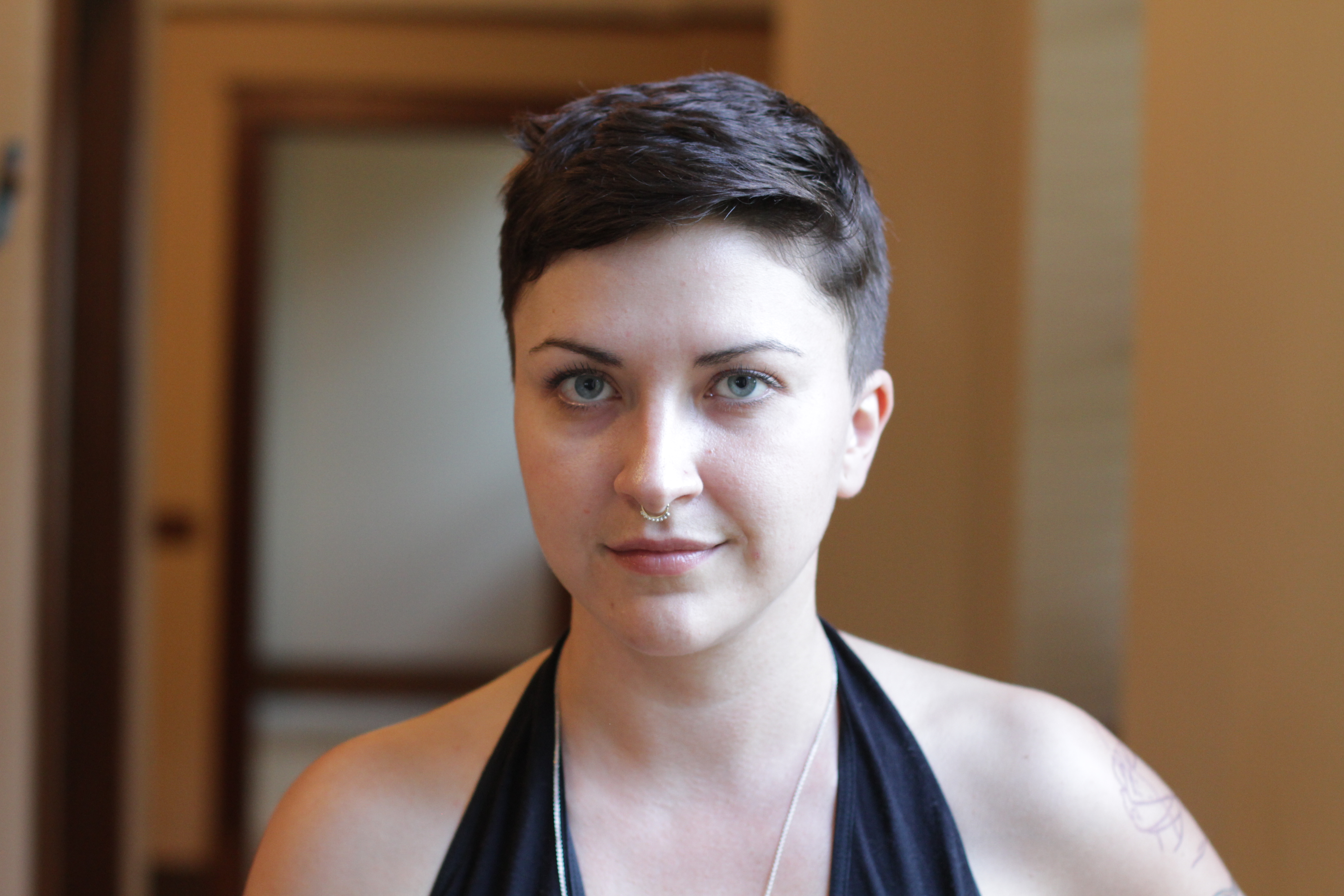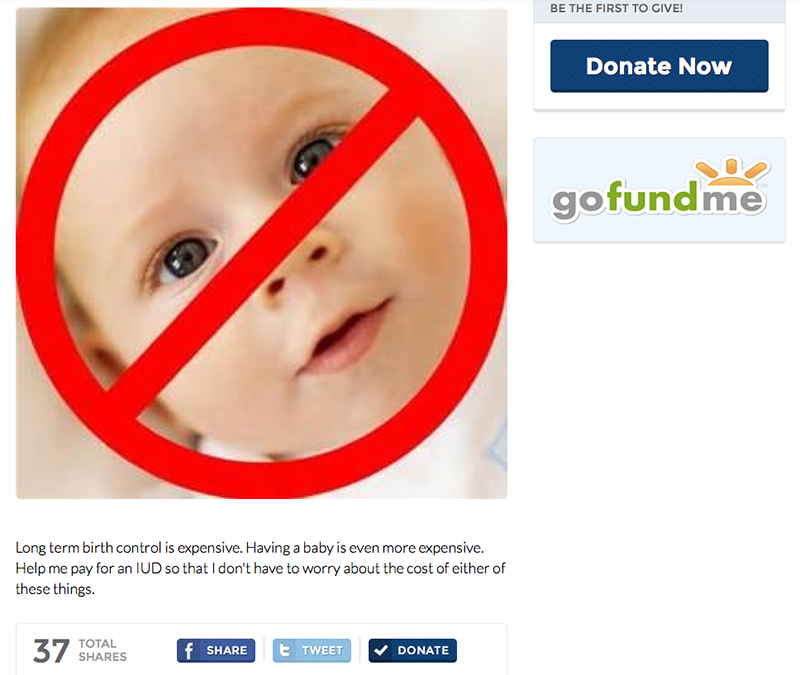CONTRACEPTIVE METHOD CHOICEHere's a look at the most popular forms of contraceptives as of 2010. Figures represent the percentage of all contraceptive users.• 27.5 percent: pill (combined estrogen and progestin)• 26.6 percent: tubal female sterilization• 16.3 percent: male condom• 10 percent: vasectomy (male sterilization)• 5.6 percent: intrauterine device (IUD)• 5.2 percent: withdrawal• 3.8 percent: injectable• 2.2 percent: vaginal ring• 0.7 percent: patch• 0.5 percent: implantSource: Guttmacher Institute
Updated at 11:52 a.m. to reflect new information as it becomes available.
Lauren Kramer doesn't want a baby. And she's asking for your money to help.
Last week, she took to the Web asking for $800 to help pay for her birth control. She posted her plea on Go Fund Me, a crowdfunding site that helps people raise cash for such causes as repaying medical debt, rebuilding after natural disasters or caring for an ailing pet.
Her plea was simple:
"Long term birth control is expensive. Having a baby is even more expensive. Help me pay for an IUD so that I don't have to worry about the cost of either of these things."
Kramer, 27, had previously used Go Fund Me to raise a few hundred dollars for a friend whose home was lost to fire. So she thought she would try the same thing to pay for her IUD, or intrauterine device.
So far, no one has donated toward her $800 goal. But even if she raises no cash, Kramer will be happy with raising awareness about contraception access and affordability.
"I would love the money for it," she said. "Do I necessarily expect to raise the money? I don't know. If I do, that would be great. It is sort of a statement."
And partly an experiment.
Last month, Go Fund Me came under national fire after an Illinois woman named Bailey asked for help funding her abortion on the site. After raising more than $1,000 of her $2,500 goal, the website pulled the post and updated its policy to ban campaigns directly funding abortions.
Kramer is passionate about reproductive health. She thinks there's not enough education about sex and that birth control is often unaffordable or inaccessible.
"This is an issue that's very important to me," she said.
She's among a group of locals called Choice Chattanooga that's aimed at bringing back an abortion clinic or other type of reproductive health-care facility to Chattanooga, which had an abortion clinic until 1993.
But first the group is working to defeat Amendment 1, a question on the November ballot that seeks to overturn a 2000 Tennessee Supreme Court ruling. The court ruled that the state constitution provides a greater right to privacy and thus to obtain an abortion than does the U.S. Constitution.
Kramer had an abortion as an 18-year-old. Even if Chattanooga doesn't get an abortion provider, she said, there's a need for more local reproductive health-care services and education.
"There's just not access to sexual education here," she said. "It's abstinence-only in Tennessee. Growing up, I just didn't get the sex ed I needed."
Women are increasingly choosing long-term birth control options like IUDs, which are small T-shaped devices inserted into the uterus for several years at a time. IUDs, which release either hormones or copper, interfere with the sperm's ability to reach the egg.
A New York Times analysis last month found IUDs and hormonal implants to be among the most effective birth control methods over a 10-year span. And last week the American Academy of Pediatrics recommended long-acting, reversible options like IUDs as the preferred way of preventing teen pregnancy.
While these long-term options can cost hundreds of dollars up front, they are cheaper than the monthly cost of other methods, said Rachel Schulson, executive director of A Step Ahead Foundation Chattanooga, which was recently founded to help provide women with free long-term birth control. The organization provides a 24-hour call center and provides free transportation to clinics. The foundation covers the cost of a five- or 10-year IUD or a three-year subdermal implant.
"We fund those because half of women that get pregnant unintentionally were using birth control," said Schulson. "They were just using it inconsistently or incorrectly."
There are 62 million women of child-bearing age in the United States, and 62 percent of them are using some form of contraception, according to the Guttmacher Institute, which provides research, policy analysis and education on sexual and reproductive health.
Schulson says all women should have access to free, long-term contraceptives.
"Unintended pregnancy is really a poverty issue at its heart," she said. "When all women have access to birth control, they can plan their education, their careers and their families."
Plus, she said, nearly 900,000 abortions could be avoided each year with the use of long-term contraceptives.
The Chattanooga-Hamilton County Health Department is partnering with the foundation. Its family planning services see several thousand women each year. Multiple forms of birth control are available on a sliding-fee scale, though oral contraceptives and hormonal injections are the most popular.
"I think that we need to educate our community a little better about the accessibility of the methods that we do have," said Patti Holmes, maternal and child health program manager. "They are available. It's just a matter of people knowing where to go and get them."
Kramer had raised $145 of $800 by noon on Tuesday.
Contact staff writer Kevin Hardy at khardy@timesfreepress.com or 423-757-6249.


